Living In Singapore: Pros & Cons You Should Know
Singapore is often described as a city that works, and it totally deserves its reputation. This small island nation in Southeast Asia has built one...
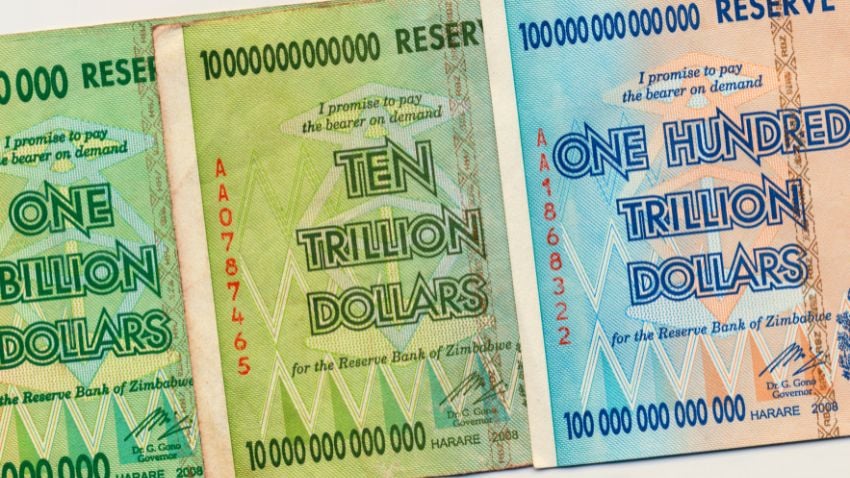
7 min read
Would you trade your gold or US Dollars for Zimbabwe's new "gold-backed" currency (ZiG)? This question might sound strange, but it really digs into what’s going on with Zimbabwe’s new economic experiment. Zimbabwe's announcement that it will launch a new gold-backed currency isn’t raising much hope among Zimbabweans and economists - or myself, for that matter. This move demonstrates a desperate attempt to stabilize a collapsing economy and serves as a harsh reminder of the dangers of reckless governance and economic mismanagement.
Let’s take a closer look.
To grasp the significance of this decision, we must return to Zimbabwe's terrible hyperinflationary time. A country formerly called the "breadbasket of Africa," Zimbabwe's economic crisis began in the early 2000s.
Claiming to eliminate land inequalities between colonizers and Zimbabweans, the government launched a rapid land reform program. This program resulted in land expropriation from white farmers and transferred to certain black farmers. Land redistribution can be defined as the ruling party transferring fertile land to its own circle and cronies. As wealth transferred from whites to certain blacks in newly established Zimbabwe, your proximity to the ruling party became the primary determinant of your fortune.
As expected, the government's redistributive policy has led to a significant decline in agricultural productivity, a crucial element of the country's economy. Much like any crony whose wealth stems not from hard work or entrepreneurial skills but from corrupted political connections, the new owners of the fertile land have burdened society with inefficiency and unproductivity. This situation highlights the detrimental effects of government-facilitated wealth transfer, which rewards political loyalty over economic merit. Once more, economic redistribution consolidated the power among a select few at the expense of a wider population.
A classic tale of government intervention gone hilariously wrong, as if someone decided to make a parody of economic policy and it was tragically taken seriously. Here's what happened: the government, in its infinite wisdom, has produced a spectacular fiasco in agriculture, effectively torpedoing a once thriving export sector. When the curtain rose on this tragicomedy, foreign investors didn't just walk away; they sprinted. International sanctions piled on each other thanks to the government's ability to make decisions without knowing the first thing about the free market economy. What was the result? An economic devastation that you couldn't do even if you intended to.
The story ended with food shortages and the collapse of the agricultural sector. As if to set a record, the Zimbabwean government demonstrated how to create an economic crisis. The Western world added a pinch of sanctions to keep up because the situation was not dire enough.
Finally, the Zimbabwean government discovered a new policy to counter the economic crisis: unlimited money printing! This led to surreal hyperinflation that reached an annual rate of 89.7 percent sextillion in 2008. (For those of you who have never seen a sextillion, here is the number: 1.000.000.000.000.000.000.000) The Zimbabwean dollar plummeted, destroying savings and driving millions into poverty.
.jpg?width=850&height=478&name=Zimbabwe%20trillion%20dollar%20banknotes%2c%20absurd%20face%20value%20due%20to%20hyperflation%20caused%20by%20expansion%20of%20the%20monetary%20base%20(printing%20money).jpg)
Zimbabwe trillion dollar banknotes, absurd face value due to hyperinflation caused by expansion of the monetary base (money printing)
Zimbabwe's hyperinflation peaked in November 2008, with an extraordinary monthly inflation rate of 79.6 billion percent, according to the International Monetary Fund (IMF). If you find it difficult to grasp what living with that level of inflation is like, let me put it into perspective for you. The prices doubled approximately every 24.7 hours. For instance, even the infamous hyperinflation in Weimar, Germany, in the 1920s saw prices double every 3.7 days at its peak, a rate far lower than Zimbabwe's. At a moment when the cost of printing money had already far exceeded its value, the Zimbabwean government made another unprecedented innovation by introducing a 100 trillion Zimbabwean dollar note.
The Reserve Bank of Zimbabwe (RBZ) began printing money in unprecedented quantities to fund budget deficits and maintain government spending. This measure was carried out without any growth in national output or reserves, resulting in hyperinflation. The government's spending, which included payouts to war veterans and salaries for an overburdened civil service, considerably outpaced its receipts, worsening the deficit.
Zimbabwe's public debt multiplied as the government printed money to cover its deficit. External debt increased as the country borrowed to finance critical imports such as food and gasoline, severely straining the economy. By the end of 2008, Zimbabwe's entire governmental debt was estimated to be more than 200% of its GDP, an unsustainable level.
The printed money was primarily used to fund government expenses, such as the previously mentioned payouts to war veterans and civil service salaries. These policies were politically motivated to maintain loyalty and support despite growing displeasure with the government's policies. Furthermore, cash was distributed to subsidize quasi-governmental organizations and failing state firms, emptying the coffers while generating no long-term revenue or economic investment.
This economic policy, doomed from the start, coupled with a total lack of trust in the government’s ability to support its own currency, led to the Zimbabwean dollar being dropped in 2009. Everyone started using foreign currencies instead, with the US dollar taking the lead in bringing back some stability. This switch basically pushed the Zimbabwean dollar out of the picture, helping to stabilize prices and cool down inflation, which in turn kickstarted a bit of an economic recovery. When the government lost the ability to print money, the market quickly recovered and saved trade from turning into a completely barter economy.
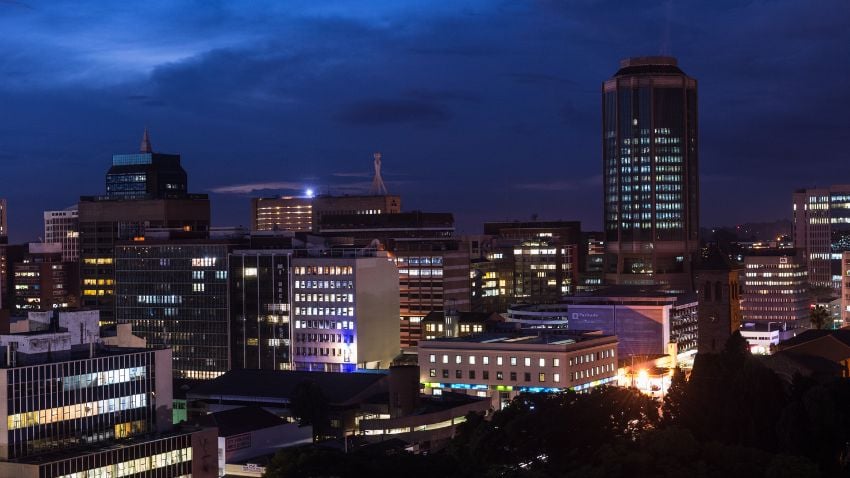
Dusk view of downtown Harare, Zimbabwe
In June 2019, the Reserve Bank of Zimbabwe reintroduced the Zimbabwe dollar (ZWL$) to regain control over monetary policy or to print money at will again. Fearing fair competition, the Zimbabwean government banned using foreign currencies in domestic transactions. The move was allegedly aimed at managing the US currency shortage, stabilizing the exchange rate and increasing liquidity. However, businesses and the public knew the government's true intentions and had little doubt that hyperinflation would return.
One of my employees, who is from Zimbabwe, commented on the cycle of inflation:
“Well, the issue here is that confidence is incredibly low, and it seems like everyone's treating it like a joke, with an attitude of "been there, done that" or "here we go again." I can't really blame them—Zimbabwe has pretty much tried everything, and unfortunately, things have failed miserably every time. We actually have some really good ideas, but they're almost always doomed to fail because of the corruption at the top. One of our worst Governors, Dr. Gideon Gono, the man obsessed with printing money—he's the one who introduced that infamous 1 trillion dollar note that couldn't even buy a loaf of bread—once said, ‘You can change currencies all you want, but if Zimbabweans don't address the elephant in the room, none of them will ever work.’ And that elephant, quite simply, is bad politics and corruption. I still have hope, though. Every day, more and more Zimbabweans are recognizing the need for change and starting to demand accountability and transparency. Change takes time, and the road ahead is long. However, we don’t have any other option but to reform the government to create a future for ourselves.”
As expected, the Zimbabwean government's money-printing impulse continued unchecked. Zimbabwe's inflation rose again in 2020, worsening an already fragile economic situation. The inflation rate rose to over 600% in mid-2020, among the highest in the world, but fell marginally by the end of the year. Prices of goods and services rose rapidly during this period, greatly eroding the purchasing power and living standards of most Zimbabweans.
.jpg?width=850&height=478&name=Fool%E2%80%99s%20Gold_%20What%20To%20Expect%20From%20Gold-Backed%20Zimbabwean%20Currency%20(ZiG).jpg)
Zimbabwe Downtown District on a spring day
Zimbabwe's economy depends significantly on imports of both consumer and capital goods. The lack of foreign money made it impossible for firms to import essential commodities, resulting in scarcity and speculative pricing. This scarcity was compounded by the government's tight control over foreign exchange markets, which resulted in the formation of a parallel market with much higher exchange rates than the official ones.
Zimbabwe experienced one of its worst droughts in decades in 2019, reducing agricultural output, a vital sector of the economy. Reduced agricultural production caused food shortages, which contributed to food inflation. Maize, a major grain, has soared in price, significantly influencing food security and general inflation.
The global COVID-19 epidemic, which began in early 2020, significantly burdened Zimbabwe's economy due to authoritarian confinement measures imposed on the population with the prerogative of slowing the spread of the virus. These measures further damaged the country's already weakened economic activity, while reducing tax revenues and increasing government spending on health care. Furthermore, the pandemic has disrupted global supply chains, worsening the situation in Zimbabwe, which relies heavily on imports.
The problem starts when you dollarize the economy; you need your exports to exceed your imports to maintain access to money you can't print yourself. In Zimbabwe, with minimal foreign direct investment and a quick rise in the dollar, this balance was precarious. The nation's economic output was inefficient, particularly in the face of increased government spending and dwindling revenues. Predictably, the government fell back on its old habits, creating money out of thin air. Inflation is the shortest and fastest monetary policy when the main job of governments is to enrich their cronies instead of providing basic public services.
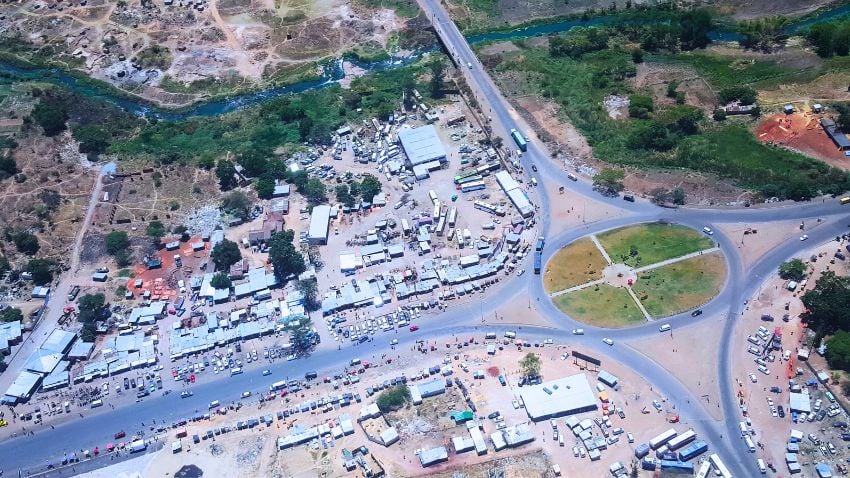
Harare, Zimbabwe
At the heart of this recurring tragedy in Zimbabwe is the failure to institutionalize property rights, the foundation of freedom and civilization.
The British colonized Zimbabwe, taking fertile territory and condemning Zimbabweans to unproductive soil. Instead of making unproductive land Zimbabweans' private property, colonialists just granted them the right to work it. Furthermore, they used various ethnic groups against one another to subjugate the populace.
However, even before the arrival of the British, Zimbabwe lacked a private property system. Clans owned land collectively, and contemporary market relations had not emerged. On top of these premodern relations, the British imposed discrimination that further pushed Zimbabweans into old clan loyalties and the midst of bitter clan conflicts.
The 2000 land reform was an effort by the ruling party to confiscate wealth for its own cronies. In Zimbabwe, where private property is not secure, and individual rights are not protected, this vast socioeconomic government involvement has completely destroyed an already broken social and economic system, leaving ordinary Zimbabweans trying to survive in chaos.
The 2017 military coup and the presidential election did not change the picture above significantly. Zimbabweans have been subjected to a government that does not recognize the rule of law, has no regard for private property, and is unaware of natural rights.
In 2024, the government insists that the people continue to rely on the gold-backed Zimbabwean currency as if nothing has happened. Zimbabweans do not need the Zimbabwe dollar; instead, they need the security of their private property rights, the protection of their individual rights, and the elimination of the state from economic affairs. Zimbabweans deserve this actual gold standard.
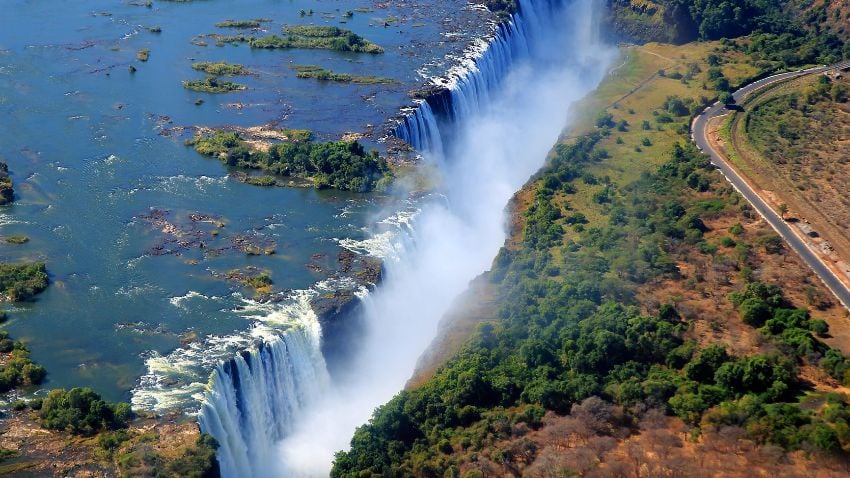
Victoria Falls, Hwang District in Matabeleland North, Zimbabwe
Given Zimbabwe's turbulent economic history, the launch of the gold-backed Zimbabwe Currency (ZiG) is, unfortunately, nothing more than a joke. It would be more realistic to see the ZiG as a new government scheme to take what Zimbabweans have left in their hands. This pattern of using monetary policy as a tool for corruption highlights a deep-rooted problem with too much government control over the economy. With their policies of economic planning, redistributing resources and impoverishing the population through inflation, politicians have long lost credibility.
There is no need to reinvent ways to create wealth. Limited government and a free market economy can enable the poorest countries to transform themselves into wealthy societies within decades. A gold-backed currency, while symbolic, cannot by itself address the fundamental challenges that plague Zimbabwe's economy. Zimbabwe must prioritize the restoration of private property rights, protect individual liberties, and limit government meddling in the economy.
There’s really no good reason to think that governments, which have long used their power to print money to keep themselves in power, are going to start looking out for the common good all of a sudden. This brings us to how the Zimbabwean government handles the Zimbabwean Gold (ZiG) currency. They're basically asking Zimbabweans and even foreign investors just to take their word that they can back their currency with gold and keep it up for years. But honestly, there’s no solid proof to back that up. The smart move? Stay as far away from ZiG as you can. The government doesn't have enough gold to support it, and foreign investors aren't exactly lining up to trade their US Dollars for ZiG. If anyone knows this better than I do, it’s the Zimbabweans themselves. This whole situation shows why it's wise to be wary of big government promises, especially regarding money.
If you want the best intel from the expat world, including profitable offshore opportunities, little-known tax-saving strategies, and hard-won insights on immigration, passports, and Plan-B residencies, all delivered to your inbox every single week, then join our daily correspondence, EMS Pulse®. Currently enjoyed by over 84,000 expats and expat-hopefuls worldwide. Fill in the form below to join our newsletter free:

Written by Mikkel Thorup
Mikkel Thorup is the world’s most sought-after expat consultant. He focuses on helping high-net-worth private clients to legally mitigate tax liabilities, obtain a second residency and citizenship, and assemble a portfolio of foreign investments including international real estate, timber plantations, agricultural land and other hard-money tangible assets. Mikkel is the Founder and CEO at Expat Money®, a private consulting firm started in 2017. He hosts the popular weekly podcast, the Expat Money Show, and wrote the definitive #1-Best Selling book Expat Secrets - How To Pay Zero Taxes, Live Overseas And Make Giant Piles Of Money, and his second book: Expats Guide On Moving To Mexico.
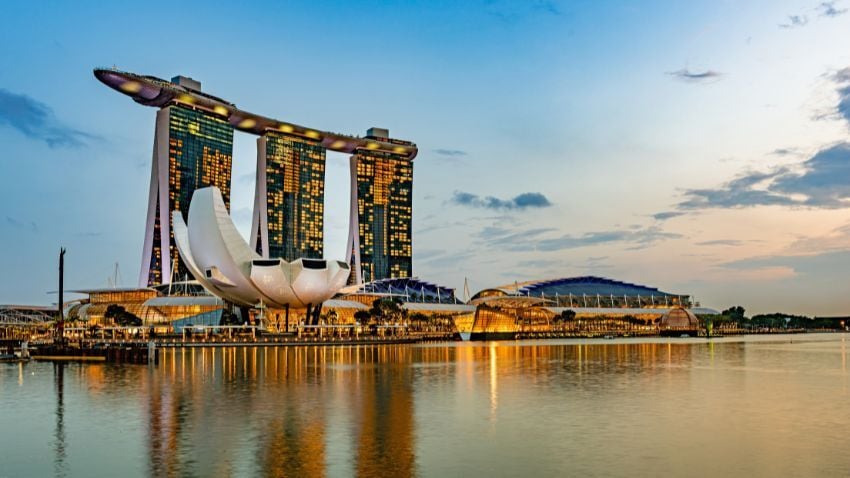
Singapore is often described as a city that works, and it totally deserves its reputation. This small island nation in Southeast Asia has built one...

Panama’s geographic size is modest, but its global relevance is not. The country connects two oceans and two continents, operates on a dollarized...

Honduras’ newly elected president, Nasry Asfura of the conservative National Party, was sworn in on January 27, 2026. The election, held on November...